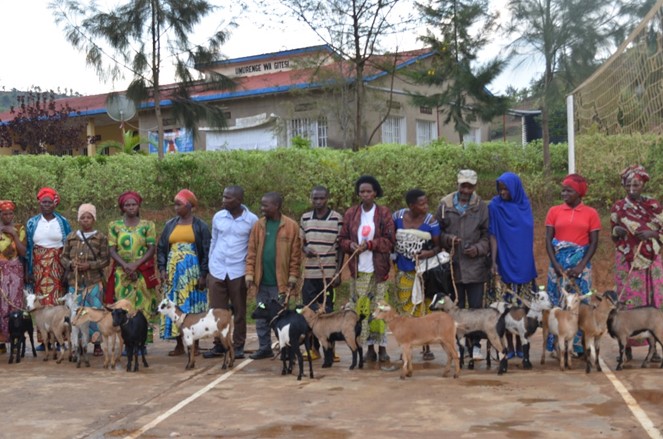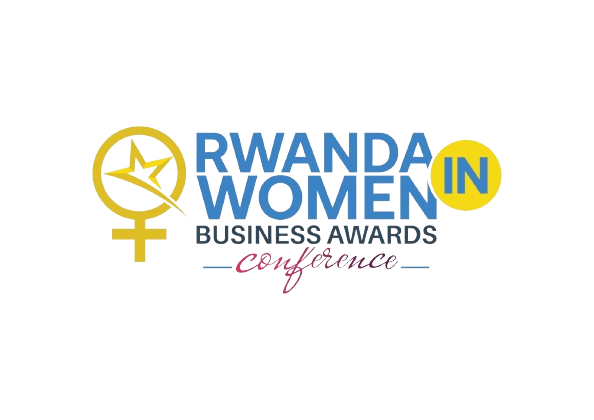| DUTERIMBERE ONG B.P. 738 Kigali, Rwanda Tél. (250) 255119216 E-mail: [email protected] Website: www.duterimbere.org.rw Boulevard de l’OUA |

Duterimbere NGO
Commendable Role in the 30-year of Transformation in Gender Equality and Women’s Empowerment in Rwanda
Editorial
Rwanda’s transformative journey towards gender equality and women’s empowerment over the past three decades, owes so much to Duterimbere NGO, a Non-Governmental Organization that was. established in 1987 by a group of 29 visionary women. This national NGO has been dedicated to enhancing the visibility and contributions of women in the country’s development. By focusing on empowering economically active yet vulnerable women, Duterimbere NGO has fostered entrepreneurial skills that not only uplift individual households but also contribute significantly to poverty alleviation. Through various programs and initiatives, the organization has championed the cause of women, ensuring they have access to resources, training, and support necessary to thrive in society, thereby facilitating a broader cultural shift towards gender equity in Rwanda.
Duterimbere NGO’s mission is realized through a multifaceted approach that includes action-research, support for women’s economic initiatives, and highlighting the vital contributions of women to community development. Additionally, the organization advocates for policy changes and promotes service delivery that prioritizes women’s needs, aiming to provide effective solutions to the unique challenges they face. In line with this mission, Duterimbere NGO established Duterimbere Micro Finance-PLC, which focuses on delivering women-centered financial services in a sustainable manner. Presently, the organization boasts a membership of 1,044 individuals across the nation. The governance structure of DUTERIMBERE includes a General Assembly and a Board, which is further divided into several committees, such as the Bureau, internal auditors, a conflict resolution committee, and eleven regional committees. The Executive Secretariat, led by the Executive Secretary, is supported by technical and administrative staff, ensuring efficient operations and support for its members.
Vision, Mission and core values
We envision a thriving nation where empowered Rwandan women play a pivotal role in eradicating poverty, driven by our mission to enhance the living standards of economically active women with low incomes through the promotion of entrepreneurship. Our efforts are anchored in core values of integrity, equity, creativity, teamwork, and accountability, guiding us as we strive to achieve our objectives and uplift the community.
What we believe
We firmly believe that our commitment to excellence, accountability, and professionalism is essential in serving our community effectively. Central to our philosophy is the understanding that collaboration and partnerships are vital for success; we recognize that we cannot meet every need alone, but through knowledge-sharing and advocacy, we can fulfill our mission.
We engage with a diverse range of national and international partners, including government entities, development organizations, and civil society, to enhance our impact. Moreover, we prioritize joint planning and actively listen to the aspirations of our beneficiaries, ensuring that our resources align with their needs.
Our innovative mindset drives us to remain adaptable, leveraging technology to refine our methods and achieve our goals more efficiently.
Gender inequality is not just a social issue; it is a deeply ingrained condition that perpetuates poverty and hinders community development. To foster the inclusive and thriving communities we envision, we must reject the marginalization of women. By providing women with innovative skills, essential resources, and meaningful opportunities through community social connectors, we empower them to become transformative leaders within their own neighborhoods. Our approach is grounded in empathy, collaboration, authenticity, and compassion, which are vital in driving the change we aspire to see.
Focus Areas
• Our efforts are concentrated on the economic empowerment of women, primarily through entrepreneurship, access to finance, market linkage, food security, horticultural value chain development, employment creation, and advocacy. We also address cross-cutting issues such as environmental protection, peacebuilding, gender equality, reproductive health, HIV/AIDS, and social inclusion.
Developmental Approach:
• At Duterimbere NGO, we prioritize vulnerable and resource-poor women, as well as other at-risk groups such as youth, placing them at the forefront of our initiatives. We explore the implementation of innovative techniques and the integration of new knowledge as essential tools for development. Accordingly, we value action research, training, and the acquisition of new skills and knowledge, alNGOside advocacy for beneficiaries, improved access to finance, the development of pro-poor financial products, and the collective accumulation of resources as effective strategies for poverty eradication within our communities.
Target Group:
• Duterimbere NGO supports economically active individuals who are poor, vulnerable, and marginalized. Our primary focus is on women entrepreneurs, acknowledging the significant barriers and gender inequalities they continue to endure due to cultural and traditional factors.

House hold leaders receiving support that helps them to improve their livelihoods
• We also strive to actively engage youth, including both boys and girls, especially those who are victims of sexual and gender-based violence (SGBV), teenage mothers, youth with disabilities, and those from economically disadvantaged backgrounds.


Some of the Persons with disabilities that benefited from our programs
STRATEGIC GOALS
1. STRATEGIC OBJECTIVE 1:
1.1. Organizational and institutional capacity development
To achieve our mission in a sustainable manner, we recognize that institutional capacity building is a lNGO-term endeavor requiring a comprehensive approach that engages all stakeholders at Duterimbere, including members, board members, management, and support staff. This critical area focuses on institutional building, development, human resource enhancement, management and administrative improvement, as well as financial strengthening, which is essential for securing sufficient funding to support our initiatives.
In 2023, we undertook the following activities to advance this objective:
• Regularly organized statutory meetings, including General Assembly sessions, Board meetings, and meetings for the Reconciliation and Internal Audit Committees, as well as staff meetings.
• Conducted both internal and external audits on a consistent basis.
• Developed new projects and secured the corresponding funding.
In this chapter, we affirm that nearly all planned activities were successfully executed. Duterimbere NGO conducted a series of statutory meetings, including board, committee, regional, and general assembly meetings. These meetings served to establish strategic guidelines that have directed the activities of the Executive Secretariat.

Photo taken during the meeting of Duterimbere NGO Board’ members
STRATEGIC OBJECTIVE 2:
2.1 Enhance sustainable and economically viable opportunities for women.
Economic empowerment enhances women’s access to essential economic resources and opportunities, including employment, financial services, property, and other productive assets. It also facilitates skills development and access to market information. Achieving gender equality is vital for fostering a balanced economic landscape that benefits both men and women.
To further this objective, several strategies have been employed by Duterimbere NGO to amplify the voices of women:
I. Education and Training: Duterimbere NGO provides quality education and vocational training, equipping women and girls with skills relevant to sustainable enterprises.
II. Entrepreneurship Support: The organization facilitates entrepreneurship initiatives for women and young girls through mentorship, access to networks, and financial resources (including microfinance, grants, loans, and digitalization) to help them start and sustain businesses aligned with sustainable practices.
III. Promoting Green Jobs: Duterimbere NGO encourages women’s involvement in green sectors and enterprises prioritizing environmental sustainability, such as renewable energy, waste management, organic farming, and eco-friendly manufacturing.
IV. Policy and Advocacy: Duterimbere advocates for policies that promote gender equality, support women-owned businesses, and integrate sustainability into economic development plans and initiatives.
V. Capacity Building: The organization focuses on building the capacity of women’s organizations and networks, enabling them to advocate for their rights, access resources, and participate effectively in decision-making processes related to sustainable development.
VI. Awareness and Empowerment: Duterimbere raises awareness about the importance of gender equality in sustainable development and empowers women to act as catalysts for change within their communities.
Through the implementation of these strategies, Duterimbere NGO aims to foster a more inclusive and sustainable economy where women and girls are afforded equal opportunities to contribute and benefit, simultaneously advancing economic growth and environmental stewardship. During this reporting period, Duterimbere continued to concentrate on thematic intervention areas such as gender mainstreaming, entrepreneurship and employment, access to finance, and advocacy to achieve greater economic empowerment for women and youth.

One of the beneficiaries that benefited from our women economic empowerment programs.
1.1.1. Increasing Entrepreneurial Skills and Employment Opportunities for Women
It is our belief that the empowerment of women and youth, particularly girls, remains incomplete without access to decent employment. We enhance their capacity through skills training, enabling participation across various economic sectors and fostering informed choices that benefit their households. We encourage women and young individuals to engage in sectors where they hold a comparative advantage, such as market-oriented horticultural value chain development and technical and vocational occupations.
Key Actions in 2023
– Achieved a productivity rate of 16 tons/hectare for tomatoes;
– Attained 12 tons/hectare for pineapples;
– Recorded 10 tons/hectare for chili and French bean varieties;
– Reached 13 tons/hectare for other vegetables;
– Graduated 234 youth (204 girls and 30 boys) from TVET programs (tailoring, food processing, leathercraft, and hairdressing) and provided them with start-up toolkits to facilitate self-employment;
– Enabled 290 farmers (the majority being women) to access international markets through contract farming.
These highlights represent part of the projects aimed at fostering women’s economic empowerment. Below is a summary of these initiatives:
a. Climate Resilient Agriculture and Sustainable Energy Initiatives (CRA Project)
The EU-funded project titled “Rwandan CSOs engage in” is a collaborative effort amNGO a consortium of three organizations: CCOAIB, Oxfam, and Duterimbere NGO, with CCOAIB serving as the coordinator. In the second year of the CRA project implementation, an acceleration plan was established to address delays caused by the COVID-19 pandemic during the first year.
– Conducted training sessions on advocacy and agro-ecology best practices, attended by 115 participants (68 women and 47 men).
Photo taken during training on advocacy and agro-ecology best practices with CSOs
The following summary outlines the topics and discussions we engaged in regarding climate change, examining both global perspectives and the specific case of Rwanda.
• The significance of weather and climate information services for actors within the crop value chain.
• An overview of climate change at global and regional levels.
• An analysis of climate change at the national level, with a focus on Rwanda.
• Strategies for climate change mitigation and adaptation measures.
b. SUSTAINABLE LIVELIHOODS IN HORTICULTURAL VALUE CHAINS (HVC)
Since January 2023, DUTERIMBERE NGO has been collaboratively implementing the project “Sustainable Livelihoods in Horticulture Value Chains” in partnership with Oxfam Rwanda and other stakeholders across Nyagatare, Rulindo, Kamonyi, and Nyamagabe Districts. This four-year project is funded by the European Union (EU) and aims to unlock the potential of Rwanda’s horticultural value chains by ensuring the supply of safe and high-quality products to local, regional, and international markets.
Duterimbere’s intervention targets approximately 5,000 farmers, aggregators, and SMEs in Nyagatare District, initially focusing on the Commodity Chains (CC) for French Beans, Pineapples, and Tomatoes. In response to increased demand and market opportunities, the project has also incorporated the production of the Chili (Bird Eye variety) and additional initiatives, including micro-irrigation and supporting farmers’ participation in exhibitions to facilitate market linkages.

Production tomatoes scaled up to 4 tons per ha due to improved farming technics including irrigation especially during the Agriculture C season.
Farmers supported to participate in exhibitions to showcase their products to potential markets

The photo was taken during the International Women Day 8/March 2023
The production of tomatoes has been scaled up to four tons per hectare due to enhanced farming techniques, particularly the implementation of irrigation systems during the Agriculture C season. Farmers have also been supported in participating in exhibitions to showcase their products to potential markets.

The activities highlighted in this report are intended to achieve four outputs and their corresponding outcomes, summarized as follows:
• Increased investments to enhance productivity in a manner responsive to climate change and market demands.
• Increased returns for smallholder horticultural farmers.
• Enhanced access and capacity to respond to the demand and supply in local, regional, and international markets.
• Strengthened horticulture policy and regulatory framework to support productivity, income, and marketing improvements for smallholder farmers.
As of the final reporting period, January 2020 to 15th May 2024, the number of beneficiaries has risen to 4,168, comprising 2,338 women and 1,830 men. The total area under crop production has increased to 1,289 hectares within the project’s operational zones in Nyagatare, focusing on Pineapples (132 ha), Tomatoes, and other rotation vegetables (697 ha), French Beans (300 ha), and Chili (160 ha). These hectares are cultivated in rotation with other horticultural crops, including Onion, Cabbage, Amaranthus, and Eggplant.
C. Women’s Economic Empowerment Programme in Nyamagabe District
Duterimbere NGO has received support from a major donor via Trocaire International for a project titled “Women’s Economic Empowerment Programme in Nyamagabe District, Southern Province through TVET.” The aim of this initiative is to provide training in vocational technical skills to youth and young women, enabling them to create their own job opportunities post-training. The project was designed to support 60 youth over a three-year period.
Throughout the implementation of the project, all 60 youth were enrolled as planned. The participants included teen mothers, female-headed households, and vulnerable young women who successfully completed their vocational technical training in tailoring, leather craft, and food processing. The targeted support group received funding for school fees, transportation, and guidance related to initiating economic activities while also promoting awareness to avoid behaviors that could lead to unwanted pregnancies. The graduates from Cyanika TVET were provided with startup toolkits tailored to their specific trades, with the primary objective of facilitating the practical application of their acquired skills and initiating income-generating activities, thereby enabling them to become self-employed. Specifically, 47 youth graduated in tailoring, 3 in leather craft, and 10 in food processing.
Following the distribution of toolkits, the graduates successfully established their own businesses relevant to their training. The project has made a significant impact on the livelihoods of its beneficiaries, as observed during field visits where participants reported notable improvements in their daily lives, including the ability to pay for health insurance, school fees, and support their children and families. Furthermore, there has been a shift in the attitudes and perceptions of parents and community members towards these young women. Previously, there was a belief that girls who gave birth outside of marriage could not achieve financial independence; however, this perception has changed, leading to greater respect for the women who are now contributing to the well-being of their households.
Additionally, families that had previously rejected their daughters have experienced reconciliation, resulting in harmonious living arrangements as these young women actively enhance the household’s economic stability. Boys who previously harmed these girls have sought forgiveness, and many of them are now forming families together.
In conjunction with Trocaire, Duterimbere NGO has provided six advanced machines to the 60 young women after their vocational training to further support their entrepreneurial ventures.


Photo taken by Project Officer, during the installation of 6 advanced machines
Climate Resilient Communities Programs:
Achievements;
- 74 houses have been retrofitted, ensuring that owners reside in safe and habitable conditions.



- 702 livestock, including goats and pigs, have been distributed to program participants to enhance livelihoods and provide access to organic manure.


- 106 hectares of progressive terraces have been constructed on community members’ farms to mitigate erosion risks and boost agricultural productivity.


- 60 water tanks, each with a capacity of 5,000 liters, have been installed in retrofitted houses to facilitate rainwater harvesting for irrigation and sanitation purposes.

- Modern nurseries for forest, agro-forest, and fruit trees have been established to enable community members to access seedlings.




